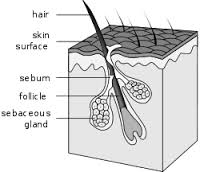This seems counter intuitive: dry hands mean low humidity, so why when humidity is increased, by washing hands, they become even more dry, eventually?
In particular, why such hand dryness is usually observed in a dry climate?
This seems counter intuitive: dry hands mean low humidity, so why when humidity is increased, by washing hands, they become even more dry, eventually?
In particular, why such hand dryness is usually observed in a dry climate?
I will assume the hand washing you speak of involves soap.
The human skin (which also covers hands) is a complex organ with an underlying system of glands.
One of these is the exocrine sebaceous gland which is responsible for the production of a substance known as sebum. This substance is primarily composed of triglycerides, wax esters and other fatty acids. Sebum makes human skin waterproof as it's constituents are not water soluble (oily).

The action of soap on oily substances typically involves increasing their solubility in water so that they can be easily rinsed upon being dissolved. So when one washes their hands with soap they remove the oil layer secreted by the glands under their skin.
Removing the oil layer makes the skin susceptible to drying up as oil reduces the rate of evaporation of water on the skin to maintain a moisture balance. This is the reason why most brands of lotion have a moisturizing effect (or marketing statement).